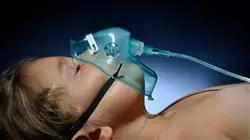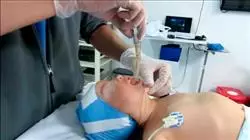University certificate
The world's largest faculty of medicine”
Introduction to the Program
This program will enable you to deal with life-threatening situations. Learn how to identify, initially treat and refer pediatric patients with emergency pathologies”

Pediatric emergencies require specific needs and skills that are very different from adult emergencies. The pediatric emergency department physician is confronted on a daily basis with cases of children affected by severe clinical conditions.
Pediatric emergency departments are those that provide care for children with and in need of immediate care and treatment. These places offer highly complex and diverse services to meet demand, providing all life-sustaining maneuvers that will guarantee continuity of care at another level of complexity.
The emergency physician must also know how to refer to patient history, if available, and how to interpret it. In this regard, prior medical history will focus primarily on conditions, investigations or hospitalizations that the children have had that may provide important data for subsequent evaluations. It is also important to determine immunization status if children are at risk of contracting preventable diseases.
A review of family history is important. Open-ended questions are more useful and often raise differential diagnostic possibilities. Close relatives or other family members may have had atypical presentations of common diseases that, in some way, can help doctors decide on a particular therapeutic route.
All these issues and more will be addressed in great detail during the development of this unique academic program on the Spanish-speaking online university scene.
Scientific evidence increases the quality of medical care. Keeping up to date is key to providing better patient care in life-threatening emergencies”
This Postgraduate diploma in Life-Threatening Pediatric Emergencies is the most complete and up-to-date scientific program on the market. The most important features include:
- Clinical cases presented by experts in the different specialties
- Its graphic, schematic and eminently practical contents contain scientific and practical information on the medical disciplines that are essential for professional practice
- The vital diagnostic-therapeutic novelties on pediatric emergency procedures; it also incorporates new contents: emergency electrocardiography, sedoanalgesia echoescopies in emergencies, etc.
- The presentation of hands-on workshops on procedures, diagnostic and therapeutic techniques
- An algorithm-based interactive learning system for decision-making in the clinical situations presented throughout the course
- Theoretical lessons, questions to the expert, debate forums on controversial topics, and individual reflection assignments
- Content that is accessible from any fixed or portable device with an Internet connection
End your search: this is the best Postgraduate diploma in Life-Threatening Pediatric Emergencies. Choose TECH and start studying tomorrow "
The teaching staff includes medical professionals who bring their experience to this training program, as well as renowned specialists from leading societies and prestigious universities.
The multimedia content, developed with the latest educational technology, will provide the professional with situated and contextual learning, i.e., a simulated environment that will provide an immersive training experience designed to train for real-life situations.
This program is designed around Problem Based Learning, where the medical professional must try to solve the different professional practice situations that arise during the course. For this purpose, specialists will be assisted by an innovative interactive video system created by renowned experts in the field of Life-Threatening Pediatric Emergencies emergencies with extensive experience.
TECH offers you the best didactic material and an innovative 100% online methodology so that you can make the most of your study time"

This Postgraduate diploma provides training in simulated environments, which allows for an immersive learning experience designed to train for real-life situations"
Why study at TECH?
TECH is the world’s largest online university. With an impressive catalog of more than 14,000 university programs available in 11 languages, it is positioned as a leader in employability, with a 99% job placement rate. In addition, it relies on an enormous faculty of more than 6,000 professors of the highest international renown.

Study at the world's largest online university and guarantee your professional success. The future starts at TECH”
The world’s best online university according to FORBES
The prestigious Forbes magazine, specialized in business and finance, has highlighted TECH as “the world's best online university” This is what they have recently stated in an article in their digital edition in which they echo the success story of this institution, “thanks to the academic offer it provides, the selection of its teaching staff, and an innovative learning method aimed at educating the professionals of the future”
A revolutionary study method, a cutting-edge faculty and a practical focus: the key to TECH's success.
The most complete study plans on the university scene
TECH offers the most complete study plans on the university scene, with syllabuses that cover fundamental concepts and, at the same time, the main scientific advances in their specific scientific areas. In addition, these programs are continuously being updated to guarantee students the academic vanguard and the most in-demand professional skills. In this way, the university's qualifications provide its graduates with a significant advantage to propel their careers to success.
TECH offers the most comprehensive and intensive study plans on the current university scene.
A world-class teaching staff
TECH's teaching staff is made up of more than 6,000 professors with the highest international recognition. Professors, researchers and top executives of multinational companies, including Isaiah Covington, performance coach of the Boston Celtics; Magda Romanska, principal investigator at Harvard MetaLAB; Ignacio Wistumba, chairman of the department of translational molecular pathology at MD Anderson Cancer Center; and D.W. Pine, creative director of TIME magazine, among others.
Internationally renowned experts, specialized in different branches of Health, Technology, Communication and Business, form part of the TECH faculty.
A unique learning method
TECH is the first university to use Relearning in all its programs. It is the best online learning methodology, accredited with international teaching quality certifications, provided by prestigious educational agencies. In addition, this disruptive educational model is complemented with the “Case Method”, thereby setting up a unique online teaching strategy. Innovative teaching resources are also implemented, including detailed videos, infographics and interactive summaries.
TECH combines Relearning and the Case Method in all its university programs to guarantee excellent theoretical and practical learning, studying whenever and wherever you want.
The world's largest online university
TECH is the world’s largest online university. We are the largest educational institution, with the best and widest online educational catalog, one hundred percent online and covering the vast majority of areas of knowledge. We offer a large selection of our own degrees and accredited online undergraduate and postgraduate degrees. In total, more than 14,000 university degrees, in eleven different languages, make us the largest educational largest in the world.
TECH has the world's most extensive catalog of academic and official programs, available in more than 11 languages.
Google Premier Partner
The American technology giant has awarded TECH the Google Google Premier Partner badge. This award, which is only available to 3% of the world's companies, highlights the efficient, flexible and tailored experience that this university provides to students. The recognition as a Google Premier Partner not only accredits the maximum rigor, performance and investment in TECH's digital infrastructures, but also places this university as one of the world's leading technology companies.
Google has positioned TECH in the top 3% of the world's most important technology companies by awarding it its Google Premier Partner badge.
The official online university of the NBA
TECH is the official online university of the NBA. Thanks to our agreement with the biggest league in basketball, we offer our students exclusive university programs, as well as a wide variety of educational resources focused on the business of the league and other areas of the sports industry. Each program is made up of a uniquely designed syllabus and features exceptional guest hosts: professionals with a distinguished sports background who will offer their expertise on the most relevant topics.
TECH has been selected by the NBA, the world's top basketball league, as its official online university.
The top-rated university by its students
Students have positioned TECH as the world's top-rated university on the main review websites, with a highest rating of 4.9 out of 5, obtained from more than 1,000 reviews. These results consolidate TECH as the benchmark university institution at an international level, reflecting the excellence and positive impact of its educational model.” reflecting the excellence and positive impact of its educational model.”
TECH is the world’s top-rated university by its students.
Leaders in employability
TECH has managed to become the leading university in employability. 99% of its students obtain jobs in the academic field they have studied, within one year of completing any of the university's programs. A similar number achieve immediate career enhancement. All this thanks to a study methodology that bases its effectiveness on the acquisition of practical skills, which are absolutely necessary for professional development.
99% of TECH graduates find a job within a year of completing their studies.
Postgraduate Diploma in Life-Threatening Pediatric Emergencies
In the medical sector, it is essential to have specialists with the skills to react immediately to different critical situations. This factor is even more necessary in pediatric units, which demand an adapted care towards patients to cover all their specific needs. This is why the preparation of doctors must be frequent in order to be able to deal with any unforeseen situation that may arise. At TECH School of Medicine we have developed a Postgraduate Diploma in Life-Threatening Pediatric Emergencies focused on providing professionals with the most updated techniques and tools to identify any emergency in a minor in a timely manner. By taking this program they will specialize in using a comprehensive approach in patients, through individualized therapies that reduce complications and sequelae in each one. Because of this, they will have the ability to deal with serious situations that compromise the life of the infant.
Become an expert in emergency care for children
The main focus of this program is to provide you with the necessary tools to strengthen your skills and obtain the necessary competencies to diagnose and treat patients with critical conditions. During six months of fully online study, you will specialize in recognizing and interpreting the signs and symptoms of a child in potentially serious situations; which, in turn, will allow you to recommend timely and effective treatments. In addition, you will be able to implement care processes in emergency units through the triage method; as a result of this, you will be able to perform follow-ups and evaluations that contribute to the comprehensive recovery of each child.
Take a postgraduate course on pediatric emergency care
At TECH we provide you with the latest educational technology, you will have schematic graphic content that contributes to improve the teaching process. Thanks to our unique methodology that includes the development of multiple simulated clinical cases, you will be able to specialize in dealing with all possible critical situations that may arise. This will contribute to develop your abilities to establish hypotheses and determine therapeutic options for the patient. As you develop this program, you will reinforce your diagnostic techniques required to provide quality care based on the latest scientific evidence. For all of the above, you will have the necessary competencies to treat cardiac, respiratory, nephrourological and infectious emergencies.







